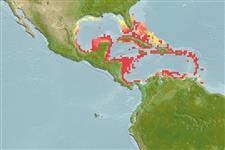Environment: milieu / climate zone / depth range / distribution range
Ecology
Marine; reef-associated; depth range 3 - 39 m (Ref. 26268), usually 6 - 30 m (Ref. 26268). Tropical; 30°N - 9°N
Western Atlantic: Florida, USA and Bahamas to Curaçao and Colombia.
Size / Weight / Age
Maturity: Lm ? range ? - ? cm
Max length : 5.1 cm TL male/unsexed; (Ref. 7251)
Dorsal soft rays (total): 69 - 75; Anal soft rays: 56 - 61. Body pale with six to ten large dark blotches which are variously positioned in different individuals but frequently at the periphery of the body; upper and lower blotches are generally in vertical alignment, the last pair often confluent; scattered small dark spots on head and body (Ref. 13442).
Inhabits bays and shallow coastal waters.
Life cycle and mating behavior
Maturity | Reproduction | Spawning | Eggs | Fecundity | Larvae
Munroe, T.A., 1998. Systematics and ecology of tonguefishes of the genus Symphurus (Cynoglossidae: Pleuronectiformes) from the western Atlantic Ocean. Fish. Bull. 96(1):1-182. (Ref. 26268)
IUCN Red List Status (Ref. 130435: Version 2024-1)
Threat to humans
Harmless
Human uses
Fisheries: commercial; aquarium: commercial
Tools
Special reports
Download XML
Internet sources
Estimates based on models
Preferred temperature (Ref.
123201): 25.6 - 28, mean 27.1 °C (based on 130 cells).
Phylogenetic diversity index (Ref.
82804): PD
50 = 0.5000 [Uniqueness, from 0.5 = low to 2.0 = high].
Bayesian length-weight: a=0.01072 (0.00507 - 0.02267), b=3.11 (2.92 - 3.30), in cm total length, based on LWR estimates for this (Sub)family-body shape (Ref.
93245).
Trophic level (Ref.
69278): 3.1 ±0.4 se; based on size and trophs of closest relatives
Resilience (Ref.
120179): High, minimum population doubling time less than 15 months (Preliminary K or Fecundity.).
Fishing Vulnerability (Ref.
59153): Low vulnerability (10 of 100).
